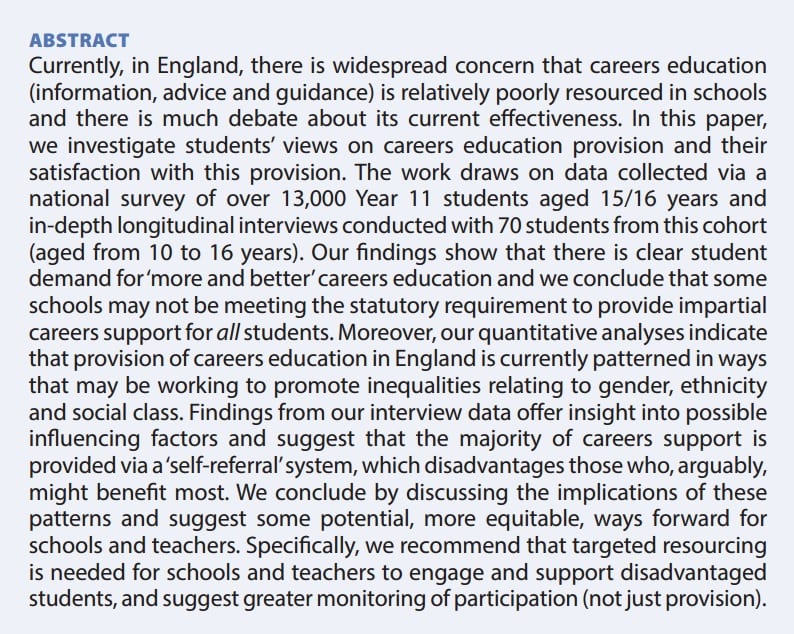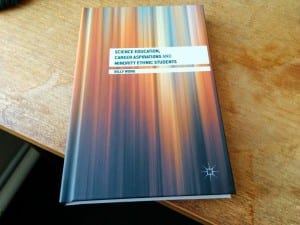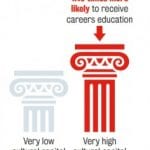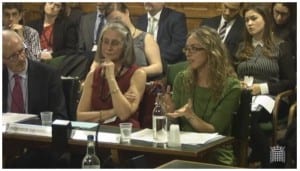What are 21-22 year olds’ experiences of careers support?
By l.archer, on 3 May 2024
By Emily Ashford, Louise Archer and Jennifer DeWitt
Effective careers education, information, advice and guidance (CEIAG) can play a valuable role in helping young people to make informed decisions about their future, for instance by providing young people with information about various educational and career options, the qualification routes required to pursue these and through practical support, for instance, with CV writing, preparing job applications, and interview techniques. Research conducted with senior leaders in schools and colleges found that almost three quarters (72%) thought that careers education provision has become even more important in recent years (Gatsby Foundation, 2020). Moreover, access to good quality careers support is recognised as being even more crucial for those from the most deprived communities, underscoring the need for equitable provision nationwide.
The statutory guidance requires that schools and colleges provide comprehensive careers education to young people from age 11-18. Educational institutions are required to inform young people about approved technical education qualifications and apprenticeships as well as academic routes. The guidance provides parameters regarding the duration and content of careers service sessions and is aimed at trying to ensure that high-quality standards are maintained (DfE, 2015).
The requirements change after young people reach age 18, with legally mandated guidance only applicable to students with an existing education, health and care plan up until the age of 25. While a range of careers provision exists for young people after the age of 18 (for instance, as provided through universities, employers and national bodies such as the National Careers Service), less is known about the experiences of young adults in accessing careers provision and any demographic patterns in terms of who is accessing provision.
The ASPIRES project
The ASPIRES study tracked a cohort of young people who were born in 1998-1999 from age 10-22. The first phase followed the young people from age 10 to 14, the second phase tracked up to age 19, and the third phase followed the young people as they move into adulthood and employment, from age 20 to 23.
The study uses quantitative, large-scale surveys (and has surveyed c. 47,000 young people to date) and qualitative data, comprising over 750 interviews conducted over time with a subset of 50 young people and their parents/ carers.
This article focuses on data from the latest wave of the survey, conducted with 21-22 year olds. It explores young people’s experiences and perspectives of what, if any, careers support they had received in the 12 months leading up to the survey.
Results
We asked young people a series of questions about their experiences of careers advice as part of our survey. We first focused on the proportion of young people who had received any careers advice in the last 12 months at the time of the survey. We then examined responses by gender, ethnicity, IMD (indices of multiple deprivation), and education/employment status.
Table 1: Percentage of young people who had accessed careers support in the last 12 months
| Group | Yes | No | Don’t know |
| Overall | 30%
|
65% | 5% |
| Gender | |||
| Female | 29% | 67% | 4% |
| Male | 33% | 63% | 4% |
| Other | 26% | 54% | 20% |
| Ethnicity | |||
| Black | 49% | 45% | 6% |
| Asian | 36% | 55% | 9% |
| White | 28% | 68% | 4% |
| Chinese or East Asian | 46% | 49% | 5% |
| Other | 34% | 59% | 7% |
| IMD | |||
| 1st and 2nd Quintiles (Lowest) | 29% | 65% | 6% |
| 3rd Quintile | 30% | 65% | 5% |
| 4th and 5th Quintiles (Highest) | 32% | 64% | 4% |
| Region | |||
| North East | 27% | 67% | 6% |
| North West | 29% | 65% | 6% |
| Yorkshire and the Humber | 26% | 68% | 6% |
| East Midlands | 31% | 63% | 6% |
| West Midlands | 31% | 65% | 4% |
| South West | 26% | 70% | 4% |
| East of England | 28% | 67% | 5% |
| South East | 30% | 65% | 5% |
| London | 39% | 55% | 6% |
| Employment/Education Status | |||
| Any work or education | 29% | 66% | 5% |
| NEET | 35% | 56% | 9% |
| Something else | 32% | 55% | 15% |
Percentages rounded to nearest whole numbers. A very small proportion of young people did not provide an answer for this question.
As detailed in Table 1, most (65%) of the young people had not received any careers support in the past year. Differences were observed by gender, IMD, and ethnicity, especially between those of White and Black ethnic origin (28% vs 49%). London stood out with a higher proportion of young people having received CEIAG in the last year compared with other regions. Just over a third (35%) of NEET young people (those not in education or employment) had received careers support compared with 29% of those in some form of education, work or training.
When asked how confident they felt that they would be able to access quality careers support if they wanted/ needed it, 55% of 21-22 year olds said that they would know where to turn, while 33% were uncertain and 12% did not know.
Among those who had received some form of CEIAG in the last 12 months, common sources included: one-to-one sessions with advisors (n=789), advice from employers or colleagues (n=714), professional career talks (n=703), and online resources (n=703). Less common sources were lessons from tutors (n=337) and careers questionnaires (n=153). Additional sources of careers support mentioned included university tutors, family, emails from university careers services, and job centres.
For those who had not accessed careers support, the main reasons given were lack of time (n=1,337), unavailability of support (n=1,315), not feeling the need (n=1,303), and difficulties in accessing services (n=1,160). Fewer individuals felt that the available support did not meet their needs (n=150). When asked to elaborate, many mentioned that the support on offer was too general and lacked specific, relevant information to their own situation. Importantly, caring responsibilities, physical or mental disabilities, and mental health concerns were also cited as key barriers preventing young people from accessing careers support.
Conclusion
In our study, almost two thirds of 21-22 year olds had not received any CEIAG in the last 12 months, suggesting a relatively low rate of access and uptake of the various services on offer nationwide. Access varied between regions and by demographics. The findings highlight the existing challenges and disparities in the provision and accessibility of careers support for young adults and suggest that some of those who might benefit most from support were not receiving such provision.
It is notable that we found a generally low rate of careers support uptake across young people, with only around a third or less having accessed provision in the last year. This is particularly concerning for those who are NEET, who are arguably especially in need of careers support. While statutory guidance for CEIAG extends to all students in schools or colleges up to the age of 18, there is a notable absence of legally mandated guidance to ensure continued support for young people beyond this age, unless they have an existing education, health, and care plan in place. This lack of mandated support may create additional challenges in reaching and assisting individuals over the age of 18 who could benefit. Some of the main barriers cited to accessing CEIAG – notably lack of time, lack of available support and relevance/ appropriateness of provision – suggest that more might usefully be done to ensure that more young people are able to access high quality, relevant careers support.
In order to improve the accessibility and uptake of careers support and services, further collaboration between government, educational institutions, employers, and community organisations may be valuable for ensuring more equitable and effective provision to young adults as they start or transition into the world of early career employment.
References
Department for Education. (2023). Careers guidance and access for education and training providers. Available at: https://www.gov.uk/government/publications/careers-guidance-provision-for-young-people-in-schools [Accessed 16 March 2023]
Gatsby Foundation. (2020). Secondary School and College leadership views on the impact of the Covid-19 Pandemic on Careers Guidance. Harrogate: Pye Tait Consulting. Available at: https://www.gatsby.org.uk/uploads/education/reports/pdf/secondary-school-and-college-leadership-views-on-the-impact-of-the-covid-19-pandemic-on-careers-guidance-summer-2020.pdf [Accessed 16 March 2023]
 Close
Close












